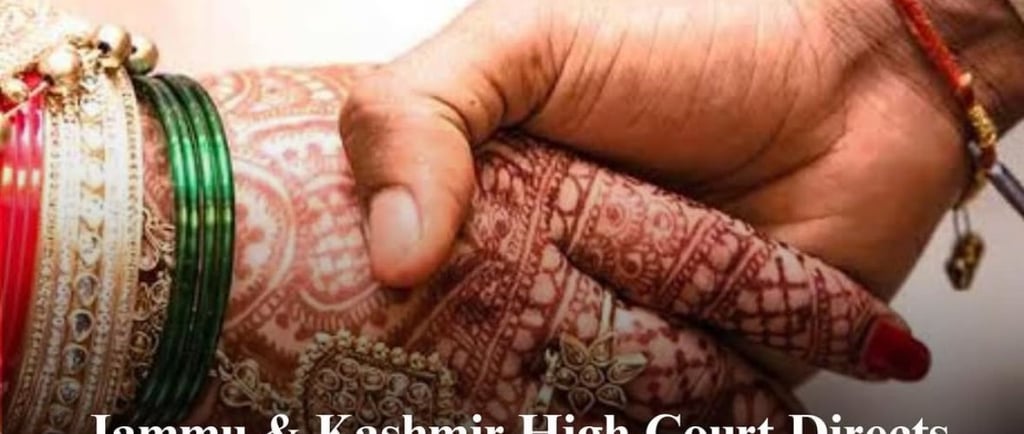J&K High Court Upholds Woman’s ST Status Despite Intercommunity Marriage
The High Court of Jammu and Kashmir and Ladakh recently intervened in a case where a woman from the Padri tribe was denied a Scheduled Tribe (ST) certificate due to her marriage to a non-Padri person. The Court ordered the authorities to review their decision and act in accordance with the clarification issued by the Ministry of Home Affairs, which states that an individual belonging to a Scheduled Caste (SC) or Scheduled Tribe (ST) retains their community status even after marrying outside their caste or tribe.
2/11/20253 min read


Justice Wasim Sadiq Nargal, who presided over the case, highlighted that the Ministry of Home Affairs had already provided a clear position on this issue. The Ministry’s clarification affirmed that caste or tribal identity is determined by birth and not altered by marriage. Despite this, the petitioner, Shivaeta Rani, was denied an ST certificate, which she required to avail herself of the benefits reserved for ST candidates in the Union Public Service Commission (UPSC) civil services examination.
Background of the Case
Shivaeta Rani, a woman from the Padri tribe, had approached the authorities seeking an ST certificate, which would enable her to apply under the reserved category for the UPSC examination. However, her request was denied on the grounds that she had married outside the Padri community. The authorities argued that her marriage had led to a loss of her tribal identity, making her ineligible for the benefits associated with her birth caste.
Rani initially challenged this decision before the Additional Deputy Commissioner of Kishtwar. However, her appeal was dismissed, with the appellate authority stating that the issue involved complex legal and technical questions that could only be resolved through the Reservation Act or a clarification from the Law Department. The appellate authority, however, granted her the liberty to approach the competent authority once again.
Determined to challenge this decision, Rani filed a petition before the High Court. Her legal counsel pointed out that the Ministry of Home Affairs had already provided guidelines that a woman’s caste or tribal status is determined by birth and remains unchanged by marriage. Furthermore, a recent communication from the Social Welfare Department to all Deputy Commissioners in Jammu and Kashmir reiterated this principle, making it clear that women cannot be denied their SC/ST/OBC status after marrying someone outside their caste or tribe.
High Court’s Observations and Ruling
Upon hearing the arguments, the High Court noted that the government’s legal position had already been clarified. The Court also observed that the counsel representing the government authority that had initially denied the certificate was not opposed to granting relief in this case, given the existing clarifications from the Ministry of Home Affairs.
During the hearing, Senior Additional Advocate General (AAG) Monika Kohli, representing the government, suggested that the matter could be resolved by allowing Rani to submit a fresh application for the ST certificate. However, Rani’s counsel highlighted the urgency of the case, stating that she needed the certificate to apply for the UPSC civil services examination and that the last date for filing the application was February 11, 2025.
Recognizing the time-sensitive nature of the matter, the Court directed the authorities to reconsider their earlier decision without requiring Rani to reapply. It specifically instructed the authorities to communicate their decision before February 11, ensuring that the petitioner could apply for the exam on time.
The Court further emphasized that the decision must be taken strictly in accordance with the clarification issued by the Social Welfare Department, which was based on the Ministry of Home Affairs’ opinion. This ruling reaffirmed the principle that a woman’s caste or tribal identity is determined by her birth and does not change due to marriage.
Implications of the Judgment
This judgment holds significant implications for women belonging to SC, ST, and Other Backward Class (OBC) communities who face similar issues after intercommunity marriages. It reinforces the legal stance that a woman does not lose her caste-based entitlements upon marriage, thereby protecting their rights under the reservation system.
The ruling also serves as a crucial precedent for authorities dealing with caste or tribe-based certification, preventing arbitrary denials based on outdated or incorrect interpretations of the law. By directing the authorities to act in accordance with the Ministry of Home Affairs’ clarification, the High Court has reinforced the principle that caste or tribal identity is an inherent right, not one that can be taken away due to personal life choices.
Furthermore, this decision underscores the importance of timely legal interventions in cases where fundamental rights and career opportunities are at stake. Had the Court not intervened, Rani might have lost her opportunity to apply for the UPSC examination under the ST category, potentially affecting her career prospects.
Conclusion
The Jammu and Kashmir High Court’s decision in Shivaeta Rani v. Union of India and Ors. is a landmark ruling in the realm of caste and tribal identity laws. By directing the authorities to reconsider their decision in line with existing legal clarifications, the Court has upheld the fundamental rights of women belonging to SC/ST communities.
This ruling not only benefits the petitioner but also sets a precedent for future cases, ensuring that women who marry outside their caste or tribe are not unfairly deprived of their rightful entitlements. The judgment highlights the necessity for administrative authorities to adhere to legal guidelines and protect the rights of marginalized communities, ensuring that justice is not denied due to bureaucratic misinterpretation.
